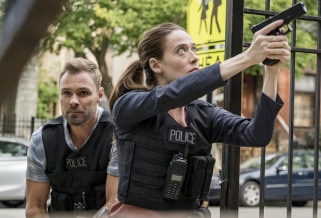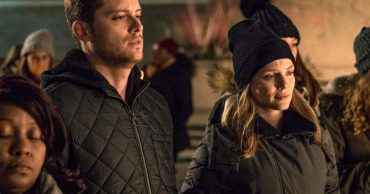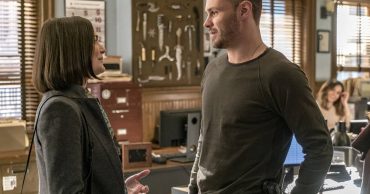
It used to be horribly ironic when television tackled current events which hadn’t yet happened. Now it seems to be standard. This week’s episode of Chicago P.D. wasn’t quite as terrifying as the events in Las Vegas, but any kind of terrorist attack brings our fear to the surface. Though smaller in scale, the bombing which Burgess, Atwater, and Ruzek witness puts all of Intelligence on edge. This is especially true for Burgess, who despite mounting evidence, steadfastly refuses to believe that a friend is responsible for an attack on her city. How do you convince others of the same faith you have when there is overwhelming evidence and prejudice?
Burgess leads the charge when her friend, fellow CPD officer Frank Toma becomes the lead suspect in a street fair bombing. Luckily there is no time for the FBI and Intelligence to be territorial. Voight won’t give up the case when someone on CPD is involved, and the FBI would never let local police, no matter how efficient, lead a terrorist investigation. Again, cooperation has become such a frequent necessity that it isn’t an issue. It is only because Burgess is such a good cop that she isn’t pushed out of the investigation. She steadfastly believes that Toma is innocent, even as more evidence is found of his presence on jihadist websites and a more, shall we say, outspoken mosque. Time and again though, we’ve seen that Burgess doesn’t lead with her passion, but follows the facts. What makes the difference is that her instinct is almost always on point.
Toma leaves just enough breadcrumbs for Intelligence to follow. His activities lead them to one of the people responsible for the bombing, who eventually gives up Mukesh Hassan, a high-level terrorist who isn’t even supposed to be on the continent, let alone setting bombs off in the heart of Chicago. Burgess is convinced there is more to the story. When she finally finds Toma, he isn’t angry, or self-righteous, or anything you think a terrorist would be. He is scared. He continues to blame himself for what happened, saying he should have done more to prevent the attack, right before taking his own life. Whatever mistakes he made, most terrorists don’t feel guilt. No one will believe Burgess, so she steals Toma’s last words to investigate on her own. Toma was guilty, of being way in over his head. He ran his own undercover operation inside a mosque he knew was connected to terrorism, but couldn’t stop their plans in time. With the evidence Toma gathered, CPD and the FBI are able to stop another attack.
For all that work and sacrifice, Toma got nothing but grief. His partner was a racist bigot who tormented Toma every day on the job. Denny doesn’t wait until the investigation is concluded to paint Toma as a terrorist, and his response to the need for a retraction and commendation for Toma is lukewarm at best. God forbid they give this young cop, who shouldn’t have gone off on his own but still had good intentions, the recognition he deserves. At the very least his parents could use the peace. The lack of response greatly angers Burgess, but Voight has been doing this a lot longer than her. He understands injustice better than most. More often than not, justice isn’t swift. It takes patience and faith to wait out those who want to just move on.
Chicago P.D. always sets up a great dialogue, and this week is no different. Were Toma’s actions justified? Was Burgess’s belief in her friend?
 Follow Us
Follow Us





